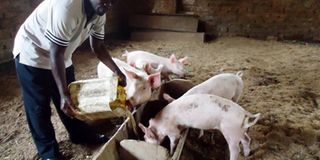How artificial insemination is a cheaper option for pigs

To improve the quality of their pigs, Ugandan farmers should consider artificial insemination.
Whenever John Kizito who has a piggery in Wakiso District notices that one of this three female pigs (sows) is on heat, he takes it a kilometre away to another farm, which has males, to mate. “It is really cumbersome,” Kizito says, “because remember they do not go on heat at the same time.”
Additionally, Kizito is supposed to avail his pigs with feed to last them the number of days they will spend at the neighbouring farm. He also has to continually check on them to ensure they have mated. This is besides the risk of acquiring infections from another farm; risks as fatal as African swine fever.
The figures
To avoid this hassle of looking for boars in the neighbourhood to mate with their females, some farmers keep their own boars for breeding. But this too is expensive if you’re keeping them solely for mating, the reason most opt to use boars in the neighbourhood.
These and more are some of the reasons why Dr Leonard Kawule of Vetline Services, a consultancy firm that deals specifically in commercial pig farming, advocates for artificial insemination for any serious pig farmer.
Way much cheaper than keeping a boar for service on the farm. Dr Kawule explains that maintaining a mature boar on the farm requires three kilos of feed per day. Since a kilo goes for Shs800, this comes to Shs 2,400 a day and Shs72,000 in a month. After serving a female, this boar takes another six months to serve and this costs Shs 432,000 in feeds.
“If you do not have up to 10 females for this boar to serve, this is a huge cost on the farmer because if this female gives birth to 10 piglets, and each is sold at Shs 100,000, then this boar has eaten feeds worth about 5 piglets. And the breeding female will also have eaten the same amount of feeds in the six months,” Dr. Kawule explains.
This actually means that the farm is just making losses if it has these two pigs. However, this cost does not include the cost at which you bought the boar as a piglet, usually about Shs100,000 and the cost incurred from feeding that boar to its required maturity of eight months when it will be old enough to appropriately service a female.
If you add the cost of water and vet care this pig needs from the time it is acquired through the months it waits to serve a female, then a piggery is simply making losses by keeping a boar for the sole purpose of mating.
A dose of artificial insemination from Vetline Services however goes for about Shs 50,000 which is far more cost effective than keeping a boar.
This cost of course is at a very low rate and is being subsidised by Kampala Capital City Authority (KCCA), which contracted Vetline Services to manage this service using their imported pure breed pigs in Gayaza.
“Such a project is too expensive for us to run as vetline,” Dr. Richard Kirigwajjo, one of the consultant veterinary doctors there said, “but we want pig farmers out here to understand its benefits and take advantage of the subsidised rates of artificial insemination that we offer in partnership with KCCA.”
Convenient way
Dr Kawule adds that artificial insemination is convenient because a farmer is certian that the semen is from a pure breed male not a crossbred boar.
Secondly, a farmer does not have to suffer challenges that the likes of Kizito and many other piggery owners go through in taking a sow away from the farm for mating. The other advantages of artificial insemination include hybrids which put on weight much faster than local breeds. This alone saves a farmer money that could have been incurred in feeding the pigs for a longer time.
Dr Kawule also says hybrids are more disease resistant compared to local breeds.
The vet also notes that when a farm has only one boar and a high number of sows, the productivity of the sows maybe limited.
He explains; “There is a tendency for pigs in the same piggery to go on heat around the same time yet a male pig needs to rest for about three days after serving. This is the reason, some sows do not conceive at all while some give birth to a few piglets because the boar is tired. This is because a boar that has just mated usually has a low sperm count.”
In the light of all these advantages, the team of veterinary doctors at Vetline Services is calling upon all pig farmers in the country to utilise the subsidised costs of artificial insemination services.
Saving farmers losses
Artificial insemination prevents the spread of sexually transmitted infections that result from mating with boars from other piggeries.
Not all farm owners may be as diligent as you are when it comes to regular treatment and vaccination of their animals and when it comes to diseases like African swine fever which has no vaccine or cure, artificial insemination will definitely save a farmer this loss.
“Because the piglets are fathered by a pure breed boar, they can then be raised to be replacement mothers on the farm,” Dr Kawule explains further. He adds that artificial insemination also comes in handy for a farmer who wants to replenish their piggery after a lot of in-breeding, something that is very expensive if pigs are to mate one-on-one.
“For example, if your piggery is in Abim and you find a good breed boar in Masaka, transporting it all the way to Abim can be rather expensive as compared to artificial insemination,” Dr Kawule says.




